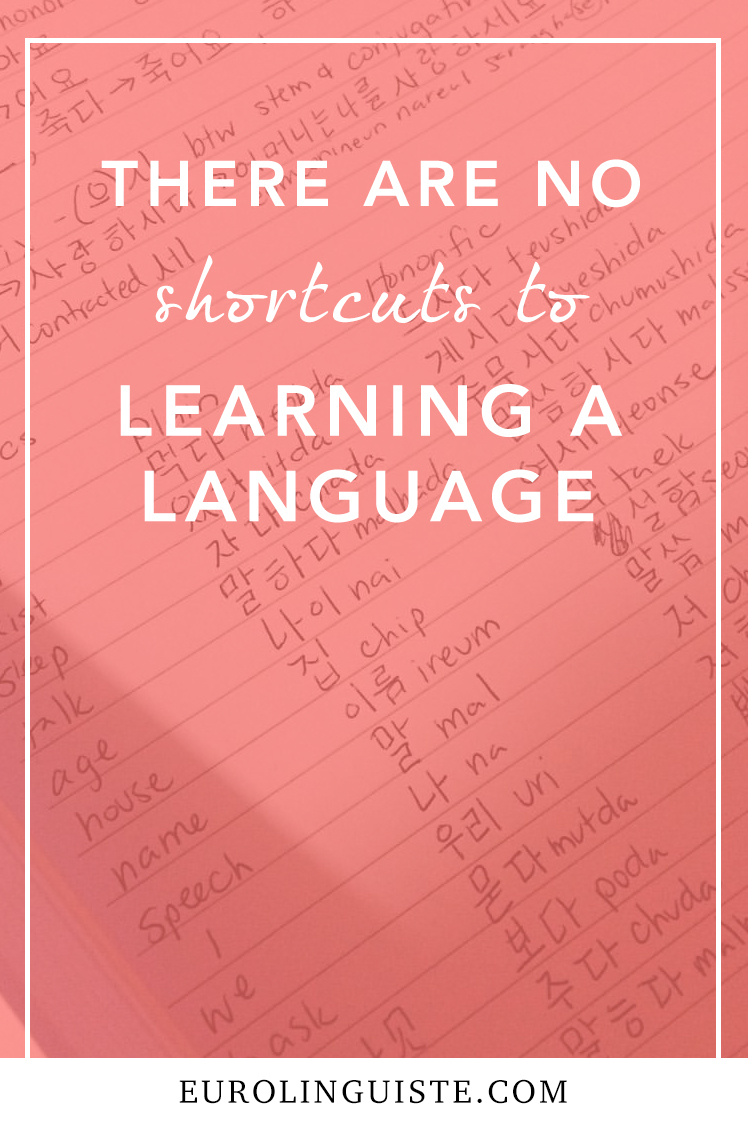There Are No Shortcuts to Learning a Language

My name is Shannon Kennedy and I'm the language lover,…
Amongst the language learning community, there are a lot of products marketed to learners as being the newest and fastest way to learn a language.
The problem with this, is with how they’re defining what it means to have learnt a language.
Is this to fluency? To basic conversation ability? It is rarely clear just what they’re offering and what they mean by just how much of the language you’ll learn (this is one of the reasons that I like Assimil – each of their products shares what level you’ll get to using CEFR, so it’s actually measurable).
From my personal experience, and that of my language learning friends, the only true way to learn a language is by putting in the time and using that time effectively.
[Tweet “The only true way to learn a language is by putting in the time and using that time effectively. @eurolinguistesk http://wp.me/p4IK5s-1rA”]There is no fast or easy way.
As I said, it’s all about putting in the time on a consistent basis.
When you’re trying to develop a skill, going weeks without study and then cramming in a ton of practice into a short window only to take another long break is a disservice to the work you’ve done. It ruins your potential growth in whatever you’re trying to do.
Why?
Because the longer you go between study sessions, the more time you need to spend reviewing. That means you spend less energy working on *new* material and never advance your learning enough to maintain your motivation.
Don’t believe the hype.
A lot of products are marketed in a way that would have you believing you could learn something quickly.
And this phenomenon doesn’t just exist amongst language learners. Its prevalent amongst nearly every craft that requires any sort of skill.
Nearly everyone is looking for the next bigger, better, faster way to improve at one skill or another, but are shortcuts really the right way to go?
It seems that people are looking for a way to reap the rewards without putting in any of the work to earn them.
So what does this have to do with language learning?
The same exact thing as it has to do with any other field.
There. is. no. shortcut.
The only way you’re going to get better is by sitting down and putting hours into practice and making the most of that time.
And it really doesn’t matter which method you use as long as you’re doing *something*. You can make any resource work for you because learning languages isn’t as much about the resource itself, but what you’re doing with it and the goals that you set for yourself.
If you aren’t spending the time in the right way, it can be as unproductive as not studying at all.
Look Beyond the End Result
In language learning, like many other fields, we often just see the end result. We see the polyglots who speak 20+ languages, the success stories, and read the well-produced recap blog posts after all the hard work has been done in the background.
This is all just a scratch on the surface.
What we miss is what goes on behind the scenes.
It’s easy to forget or write off all of the things that we don’t see. All of the hours of intensive study, of speaking practice, of coaching and training, of vocabulary learning, and of laboring that go on to create that finished “fluency.”
It’s easy to ignore because that isn’t what we see. We see the end result, not the preparation. It all seems like a magic. Someone waves their hands and we get an overnight success.
But that isn’t the case.
It’s important to remind yourself of all the hours that go into learning a new language (and to write posts that share some of the strategies that learners use to get there). There’s so much more to each of these things that you don’t see just because they happen behind the scenes. And even when language learners make their best efforts to be transparent with their methods, you’ll never really see everything that they’re doing.
There’s a good chance that you’ll feel like you’re missing something. That they have something that you don’t.
But when it comes down to it, you can’t ignore all the work that someone puts in to achieving a decent level in another language. They (often) aren’t geniuses, or exceptions to the rule, and their ability often doesn’t come as naturally to them as we’d like to think.
99.9% of the time it isn’t natural talent or luck. It’s hard work.
[Tweet “99.9% of the time successful language learning isn’t natural talent or luck. It’s hard work. @eurolinguistesk http://wp.me/p4IK5s-1rA”]So why do we want to believe it’s only talent or natural ability that enable people to excel?
Because we either don’t want to put the work in ourselves or because we want to make excuses about why we can’t do something.
We are often also attracted to the possibility that someone has a natural gift or that they were destined to do a certain thing which is why they have a knack for it. It gives us hope that we’ll find that thing we were destined for.
Even though this way of thinking often leads to our admiring those who excel at certain things (which isn’t so bad in itself – they deserve recognition for their hard work), that admiration allows us to set other language learners on a pedestal. It gives us reason to think, “oh, I could never do that.” And by thinking that, you’re putting yourself at a disadvantage before you even begin.
Developing a skill is already a struggle, but if you look at it as something that’s impossible, you’ll struggle even more.
You create a bigger barrier for yourself just by thinking that way.
Language learning can be frustrating, I’ll readily admit that I’ve had my moments of doubt. And so, it can be quite easy to understand why we might want to skip that step and move quickly from novice to expert. No one wants to experience frustration intentionally. And at certain stages, when we sit down to study, we know that’s what we’re going to feel.
Why should we keep submitting ourselves to experiencing that frustration?
Because the end result is worth it.
If we want to accomplish something meaningful or do something great, we need to deal with the frustration that comes with learning our craft.
If language learning is something we want to do, something we want to excel at, then we need to pour all of the blood, sweat and tears necessary into improving that skill.
We need to sit down in front of our course books or put our headphones on and get to work.
But we also need to evaluate the methods that we’re using to make sure that we’re practicing the right way.
When you’re learning, it isn’t enough to just go through the motions and complete the exercises as the end of each chapter. You actually need to take things that you struggle with (for me, for example, that’s Russian cases, Korean particles, and Spanish vocabulary) and work them out.
If you’re comfortable, you aren’t growing. You aren’t pushing yourself enough. You aren’t teaching yourself new things and you aren’t making the difficult aspects of your language learning easier for yourself later.
[Tweet “If you’re comfortable, you aren’t growing.@eurolinguistesk http://wp.me/p4IK5s-1rA”]If you want to do great things, then you need to make great efforts.
In Conclusion
Language learning is not just about hard work and dedicated study. It is also a way for us to express ourselves, to reach out to one another, and learn about the world. It should be something that we find enjoyable.
Even though you should stretch and push yourself when you’re learning, it’s important to also find the time to do the things you enjoy with languages as well. It doesn’t have to be all work, no play, but if you’re driven to improve it should definitely be more of the former and less of the latter.
In fact, by putting in the work, you may find that you enjoy language learning even more just because you’re reveling in the results of all of your hard work.
So the next time you find yourself envious over someone’s “natural ability” to do something you’d like to do, remember that it’s not impossible. You too can get to that point to if you’re willing to put in the work.
There are no shortcuts to language learning.
What about you?
What are your thoughts on natural talent vs hard work?
I’d love to hear from you in the comments below.
My name is Shannon Kennedy and I'm the language lover, traveler, and foodie behind Eurolinguiste. I'm also the Head Coach of the Fluent in 3 Months Bootcamp, co-founder of Women in Language, and former Resident Polyglot at Drops.



